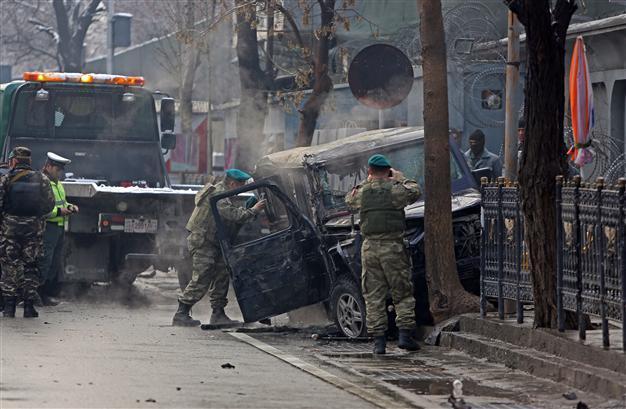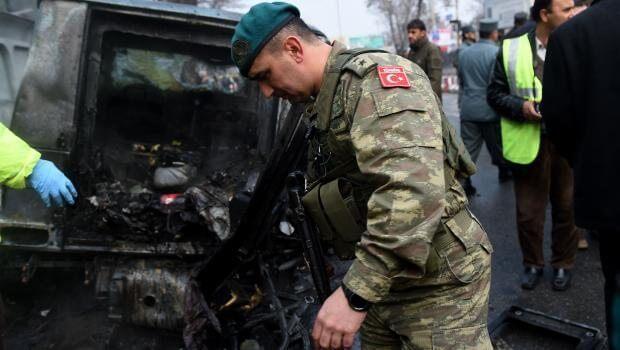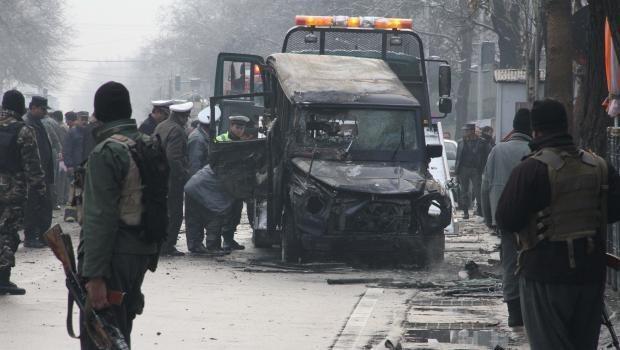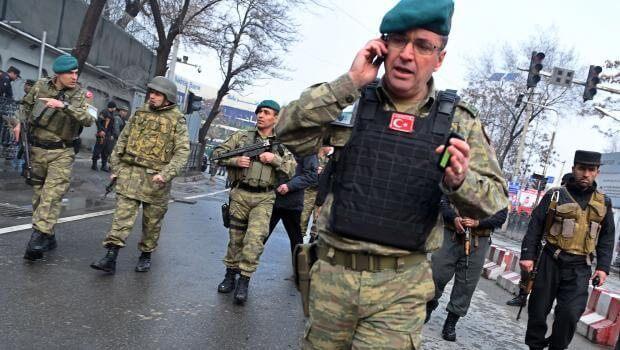Suicide attack on foreign convoy kills Turkish soldier in Kabul
KABUL

Turkish soldiers inspect a damaged vehicle at the site of a suicide attack in Kabul, Afghanistan, Thursday, Feb. 26, 2015. AP Photo
A Taliban suicide attack in Kabul has killed two people, including a Turkish soldier, highlighting the fragile security situation as the Afghan government presses for peace talks with the militants.The blast came shortly after 8:00 am (0330 GMT), not far from the Iranian embassy. Police said the dead included a Turkish national and an Afghan passer-by.
Turkey's General Staff confirmed that a Turkish soldier was killed in the attack, while another one was injured.

Kabul police spokesman Hashmat Stanikzai gave details of the attack and death toll, saying the bomber was driving a Toyota Corolla.
Abdul Rahman Rahimi, Kabul police chief, confirmed the death toll in the blast, which the Taliban claimed.
"A suicide bomber blew himself up targeting a foreign convoy in central Kabul, a number of foreigners were killed in the attack," the militants said in a message.
Taliban's spokesperson Zabihullah Mujaheed told Turkey's semi-official Anadolu Agency that "an American vehicle passing through the street where the Turkish Embassy in Kabul is located was the target."
The area was cordoned off after the blast, which left debris strewn in the road and nearby blast walls spattered with blood.
Eyewitness Mohammad Yousuf, 17, described the moment the blast happened.
"The suicide bomber was in a Toyota sedan, he detonated himself causing a big bang, soon after the explosion everywhere were black smoke," he told AFP.

It is the first major attack in Kabul's heavily-secured centre since early January, when a suicide bomber hit a European Union police vehicle, killing a passer by.
More than 13 years after the Taliban were ousted from power after a US-led invasion, their insurgency remains resilient.
NATO ended its combat mission in late December, leaving a residual force to carry on a training and support mission to Afghanistan's 350,000 security forces, who now lead the fight against the Taliban.
There have been growing hopes in recent weeks of talks between Kabul and the Taliban aimed at moving towards reconciliation after more than a decade of war.
Afghanistan's chief executive Abdullah Abdullah said on Monday that dialogue with the Taliban could begin soon and last week several militant commanders said preliminary meetings in Qatar were on the cards.
But the Taliban's central leadership has denied such moves, indicating the fragile and embryonic state of the process.

There have been several attempts at starting dialogue in recent years between the Taliban, Kabul and the United States -- the Afghan government's chief supporter -- but with little success.
The Taliban opened an office in Qatar in June 2013 as the first move towards a possible peace deal, but it shut a month later after enraging the then-Afghan president Hamid Karzai by styling it as the unofficial embassy for a government-in-exile.
The election last year of President Ashraf Ghani, who pledged to make peace talks a priority, as well as supportive signals from Pakistan, which has long held significant influence with the Taliban, has boosted hopes for possible dialogue.
But the Taliban insist talks are impossible while foreign troops remain in the country and Thursday's attack served as a stark reminder that the war is far from over.
















